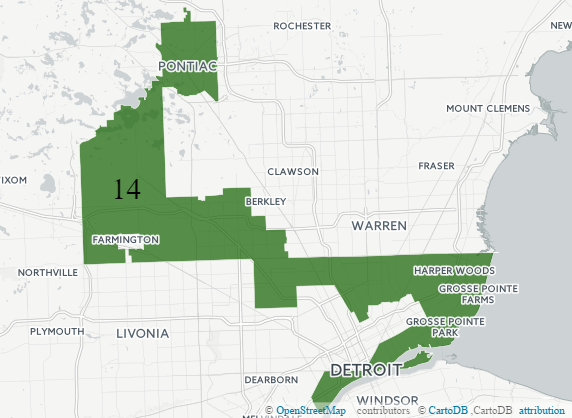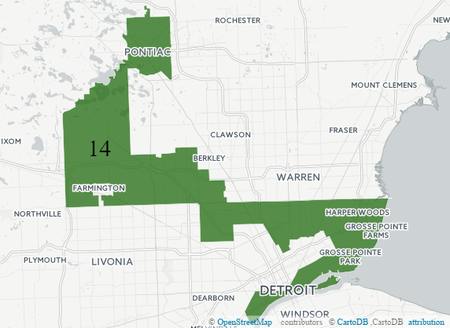Was Racism Involved in the Drawing of Michigan’s Congressional Districts?
Learn what’s considered to be racial gerrymandering and how laws from ballot campaigns might be at risk with Justice Kennedy’s retirement.


Critics argue that Republicans drew the legislative districts of Michigan with the intention of winning the majority of the 14 seats.
The 14th Congressional District—one of two majority-minority districts in our state—resembles a truck hitting a sea horse as it stretches wildly from the riverfront across Detroit, then jumps around Oakland County, and up to Pontiac.
Political scientists call this practice “packing” — that is, it puts as many voters of a certain persuasion as possible in one district in order to keep them out of other districts.
The other practice is “cracking” where one party draws legislative lines to dilute the voting power of the opposing party’s supporters, spreading them across many districts.
Here is a more specific explanation from The New York Times on “packing” and “cracking” and how it relates to the major gerrymandering cases across the nation.
Michigan Republicans oppose reforming the legislative lines in Michigan. They believe the shape of these districts exist because of the Voting Rights Act, which requires majority minority districts to be drawn so minority candidates have an adequate chance in elections.
Detroit Today host Stephen Henderson speaks with Michael McDonald, an associate professor of political science at the University of Florida and co-principle investigator on the Public Mapping Project, a project to encourage public participation in redistricting. McDonald also explains how the retirement of Supreme Court Justice Anthony Kennedy could affect gerrymandering and election law in the future.
McDonald explains exactly how the drawing of a district could have racial bias and violate the Voting Rights Act.
“If more minorities were shoved into that district than were needed in order to elect a minority candidate of choice, then the district becomes suspect. Then race was used as a predominant factor in the creation of that district.”
With Justice Kennedy’s departure, future Supreme Court decisions could impact Michigan’s past and present ballot initiatives.
According to the Constitution, McDonald states, “Any time a legislature is not involved in the creation of a commission, or anything else, by a ballot initiative process, then…in respect to any election law…that would be unconstitutional under Article I Section IV.”
“That affects then what’s happening in Michigan because there’s a ballot initiative to do redistricting reform,” says McDonald. “And it may be that this initiative is in violation.”
He says, assuming President Trump appoints a conservative justice to replace Kennedy who is then approved, that conservative power shift on the high court could make it easier to overturn the new redistricting system.
McDonald explains that this decision could overturn “any law that’s been adopted through a ballot initiative” across the country.
Click on the audio player above to hear the full conversation.
Here’s other WDET work on the gerrymandering issue:
Policy Meets the People: Introducing the Issue of Gerrymandering
Talk Show Programming
WATCH HERE: A live one-hour show with an in-studio audience and guests at 8 p.m., Tuesday, June 26. Tune in at 101.9 FM or online at WDET.org. Or join on WDET’s Facebook page where we’ll live stream the show. The show rebroadcasts at 2 p.m. Tuesday, July 3. Listen HERE for WDET 101.9 FM live online.
On DETROIT TODAY: Was Racism Involved in the Drawing of Michigan’s Congressional Districts?
Digital Specials
A Podcast Playlist – Become a Gerrymandering Expert Just By Listening
NPR’s Hidden Brain: Gerrymandering and You
News Coverage
MichMash: Here’s How You Can Influence The Drawing of District Lines in Michigan
Gerrymandering: Why It’s a Technology Issue [TRANSCRIPT]
Redistricting 101: Your District, Your Politicians, But Does Your Vote Matter?
Ohio Offers Its Own Solution to Gerrymandering [MAPS + GRAPHS]
Who Should Draw Michigan’s Political Maps? Voters May Decide [PHOTOS + MAP]
Voters Not Politicians: The Pros [TRANSCRIPT]
Voters Not Politicians: The Cons [TRANSCRIPT]
It’s a Ship….No, it’s a House…Wait, it’s a Congressional District?
Does Michigan Have a District that Looks Like Homer Simpson? You Be the Judge.
